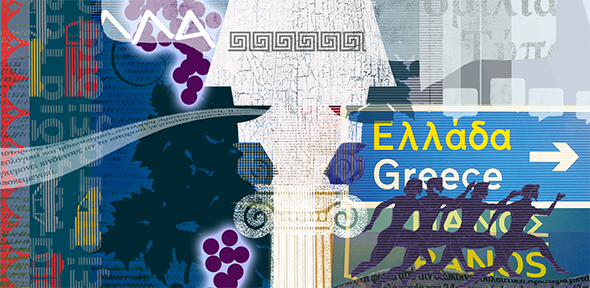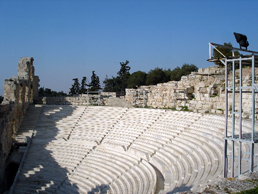
 Greek is an Indo-European language and the only member of the Hellenic branch; it has been spoken in the South-East Europe since early in the second millennium BC and has the longest recorded history of any Indo-European language. Ancient Greek, spanning from c. 1500 BC to 1600 AD, and Modern Greek (c.1700 to the present) are two major developmental stages in the long history of the language.
Greek is an Indo-European language and the only member of the Hellenic branch; it has been spoken in the South-East Europe since early in the second millennium BC and has the longest recorded history of any Indo-European language. Ancient Greek, spanning from c. 1500 BC to 1600 AD, and Modern Greek (c.1700 to the present) are two major developmental stages in the long history of the language.
Modern Greek is spoken by some 14 million people mainly in the Republic of Greece, where it is the official language, and the Republic of Cyprus as one of the two official languages.  It is also spoken by sizeable immigrant communities in the USA, Australia, Western Europe and elsewhere. Since 1981 is has been one of the official languages of the European Union as well.
It is also spoken by sizeable immigrant communities in the USA, Australia, Western Europe and elsewhere. Since 1981 is has been one of the official languages of the European Union as well.
The language has a very rich verbal and nominal morphology. There is a large number of words borrowed from other languages, such as Italian, Turkish, French, or English. Dialectal differences are minor, except for Cypriot.
Both Ancient and Modern Greek are written in the Greek alphabet, derived from the Phoenician script, comprising 24 letters.
Qualifications framework level: CEFR A1
Prerequisites
For absolute beginners or for those with very little knowledge of the language.
Educational Aims
At the Basic 1 Level the main aims are:
- to develop a basic understanding and an appreciation of the salient linguistic features;
- to develop the necessary skills for communication in predictable everyday situations;
- to develop an insight into Greek-speaking life, culture and society.
Learning Outcomes
The student will acquire the necessary skills to:
- be able to read, using accurate pronunciation and intonation;
- gain knowledge of basic and high frequency vocabular;
- to develop an insight into Greek-speaking life, culture and society;
- understand and use familiar language;
- gain sufficient intercultural awareness to interpret references to everyday life and aspects of the Greek society and culture.
| Listening/Speaking | Understand some basic instructions and information or take part in a brief informal conversation on a familiar topic. |
|---|---|
| Reading | Understand texts and dialogues on simple and familiar topics as well as notices and basic instructions. |
| Writing | Understand texts, articles and personal letters on familiar topics as well as extract predictable information in simple everyday material such as advertisements, prospectuses, menus and timetables.. |
Topics
The Course introduces students to the following functions and notions:
- Greetings
- Family and friends
- Telling the time and date
- Daily routine
- Home
- At the restaurant and the cafe
- Hobbies and past times
- Likes and dislikes
- Past events
- Directions and locations
- Weather and seasons
- Shopping (groceries and clothes)
Syllabus:
Qualifications framework level: CEFR A2 ALTE Breakthrough
Prerequisites: CULP Basic 1 / CEFR A1
This is a continuation of the Greek Basic 1 course, suitable for students who have picked up the basics in their previous studies at the introductory level.
Educational Aims
At Basic 2 Level the main aims are:
- to revise and build on the basic grammatical structures and vocabulary;
- to further develop students’ understanding of the salient linguistic features of the language;
- to establish the learner as a confident language user in a range of predictable everyday situations related to areas of immediate relevance;
- to enhance students’ understanding of contemporary Greek culture and life.
Learning Outcomes
By the end of the Course students will be able to:
| Listening/Speaking | Understand the highest frequency vocabulary related to areas of most immediate personal relevance and the main point in short, clear, simple messages and announcements. |
|---|---|
| Speaking | Communicate in simple and routine tasks requiring a simple and direct exchange of information on familiar topics and activities and handle very short social exchanges. |
| Reading | Understand texts, articles and personal letters on familiar topics as well as extract predictable information in simple everyday material such as advertisements, prospectuses, menus and timetables. |
| Writing | Write brief, simple notes and letters on familiar or predictable matters, relating to areas of immediate needs. |
Topics
The Course introduces students to the following functions and notions:
- Providing and extracting personal information (e.g. origin, age, family and relationships, characteristics and personality, employment)
- Talking about hobbies, free time activities, interests, and habits
- Describing housing, with details about different types of accommodation and outgoings
- Describing the local area and other places, weather, and nature
- Stating preferences, likes and dislikes
- Issuing and responding to invitations
- Talking about holidays and travel
- Talking about the past in general and tell stories
- Plan for the future
- Discovering Greece
- Eating in and out
- Talking about health and fitness: healthy eating and lifestyle, ailments and symptoms
- Going shopping
Syllabus:
 Greek is an Indo-European language and the only member of the Hellenic branch; it has been spoken in the South-East Europe since early in the second millennium BC and has the longest recorded history of any Indo-European language. Ancient Greek, spanning from c. 1500 BC to 1600 AD, and Modern Greek (c.1700 to the present) are two major developmental stages in the long history of the language.
Greek is an Indo-European language and the only member of the Hellenic branch; it has been spoken in the South-East Europe since early in the second millennium BC and has the longest recorded history of any Indo-European language. Ancient Greek, spanning from c. 1500 BC to 1600 AD, and Modern Greek (c.1700 to the present) are two major developmental stages in the long history of the language.
Modern Greek is spoken by some 14 million people mainly in the Republic of Greece, where it is the official language, and the Republic of Cyprus as one of the two official languages.  It is also spoken by sizeable immigrant communities in the USA, Australia, Western Europe and elsewhere. Since 1981 is has been one of the official languages of the European Union as well.
It is also spoken by sizeable immigrant communities in the USA, Australia, Western Europe and elsewhere. Since 1981 is has been one of the official languages of the European Union as well.
The language has a very rich verbal and nominal morphology. There is a large number of words borrowed from other languages, such as Italian, Turkish, French, or English. Dialectal differences are minor, except for Cypriot.
Both Ancient and Modern Greek are written in the Greek alphabet, derived from the Phoenician script, comprising 24 letters.
Qualifications framework level: CEFR A1
Prerequisites
This course is appropriate for absolute beginners (ab initio learners) with no knowledge of Ancient Greek. Those with a knowledge of Modern Greek are welcome to attend but may find the pace a little slow.
Educational Aims
At Basic 1 Level the main aims are:
- to develop a basic understanding and an appreciation of the salient linguistic features;
- to enable the learner to read sentences and short passages of Ancient Greek, including authentic passages from famous authors such as Plato and Aristophanes;
- to introduce students to the cultural and historical circumstances of Athens in the 5th and 4th centuries BC, in order to provide context for the ideas and events encountered in the texts.
Learning Outcomes
Students will acquire the necessary skills to:
- be able to read passages written in Ancient Greek by famous authors, with the help of a dictionary and grammar book where necessary;
- memorise common words and basic grammar (e.g. forms of verbs and nouns);
- gain a basic knowledge of the culture and language of Athens in the 5th and 4th centuries BC;
- be able to progress further as an independent learner after the course has finished.
| Reading | Read short passages of genuine Ancient Greek written by famous authors. |
|---|---|
| Speaking | Read aloud texts in a pronunciation that approximates the way educated people spoke in Athens in the 5th century BC. |
| Listening | Recognise words that have been pronounced in the manner of an educated 5th century BC Athenian. |
| Writing | Translate short English sentences into Ancient Greek, thereby showing an active understanding of Ancient Greek grammar. |
Content
The literature produced by the Ancient Greeks has been admired for over 2,500 years. This course will prove that in 15 sessions an absolute beginner can start to read genuine extracts of those great authors. Along the way we will learn about the authors themselves and the world they inhabited. We will also gain fascinating insights into just how much Ancient Greek has seeped into Modern English: their words and ideas are hidden all around us, and we only need a little knowledge to be able to see them.
Syllabus:


 The Language Centre
The Language Centre
